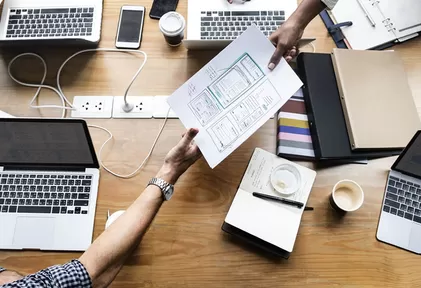Want to have a website, web shop or customised application created? Then don't forget to ask your web agency the following 16 questions! By thinking carefully about these questions, you will avoid unpleasant surprises afterwards. This way, both parties know exactly what to expect from each other and the chance of misunderstandings is minimal.
- 1. What about the costs?
- 2. Who is going to do what?
- 3. What about communication?
- 4. How will you deal with excess hours?
- 5. How quickly can you deliver?
- 6. What happens after delivery?
- 7. How fast will my website load?
- 8. How is scalability (responsiveness) handled?
- 9. What about security?
- 10. What about extensibility?
- 11. How do I make sure my website or webshop is findable?
- 12. What about ownership?
- 13. Will my website be built according to the latest programming standards?
- 14. What is the maintenance policy?
- 15. What about hosting?
- 16. What is the term and duration of the cooperation?
1. What about the costs?
Probably the most frequently asked and most important question is what about the cost of your web project.
It is difficult to give a general answer, as costs depend on several factors. What exactly do you need? A simple website or an elaborate webshop? How many pages should the website contain?
Will it use a content management system (CMS) or is it necessary to have a custom-made solution created? How complex are the functionalities you want? Do you have special requirements, for instance in terms of security or specific API integrations with other systems?
Ultimately, what matters is how much time the web agency will spend on it.
Tip: A good web agency will always give you a customised quote, with no obligation. That quote will tell you exactly what to expect and what the costs will be. So you know immediately where you stand!
2. Who is going to do what?
A web project usually involves several people working in different disciplines. It is important to know who all will be involved in the project and what role everyone will play.
Who is the project leader? Who will be responsible for development? Who will create the design? Who will do the testing? Will you write the content yourself or will the web agency do that?
→ Tip: make sure you know who from your organisation will liaise with the web agency.
3. What about communication?
An important point on which you make clear agreements in advance. How will the web agency communicate with your organisation? Will someone visit your office? Do they have a helpdesk you can go to with questions? When and how often do you want an update? How much time will the web agency take to answer your questions?
→ Tip: make sure you make clear agreements on how to communicate. This applies before, during and also after the construction of your web project.
4. How do you deal with time overruns?
Unfortunately, in practice, projects often take longer than planned. In some cases, this is inevitable, but sometimes it is also down to the web agency.
It is important to make arrangements in advance about possible overruns. How will the web agency handle this?
Is this goodwill or is it extra work? What is the definition of extra work according to the agency? Are you always obliged to pay?
→ Tip: Ask the web agency how they handle hourly overruns and overtime and make clear agreements about this. Also check the web agency's general terms and conditions.
5. How quickly can you deliver?
An important question, closely related to the first one. Of course, again everything depends on the size and complexity of the project. But a good web agency can always give you an indication of the lead time they have in mind.
→ Tip: always make sure you make clear agreements about delivery. When is the project completed? What about delivery? Who will do the testing? What happens if the schedule is not met?

6. What happens after delivery?
A website or webshop goes live, and then what? Who is responsible for maintenance? Will adjustments still be made? What about support? What are the procedures for testing and delivery? What if errors are found in the website?
→ Tip: it is important to agree in advance what will happen after going live. Clearly define who is responsible for maintenance? Will adjustments still be made? What about support? What are the procedures for testing?
7. How fast will my website load?
In order for your website to function properly and score high in search engines (SEO), it is important that your website loads quickly. Exactly how fast a website should load depends on the type of website you have. For webshops, the loading time is more important than for business websites.
→ Tip: it's useful to agree in advance on what requirements you set for the loading time of your website. When is the website fast enough for your purpose? What is the maximum number of seconds you want to wait for your website to load?
8. How is scalability (responsiveness) handled?
The world is becoming increasingly mobile. More and more people visit websites on their phones or tablets. It is therefore important that your website works well on all these different devices and that the scalability is well regulated.
→ Tip: it is useful to check whether the web agency can create responsive websites.
9. What about security?
When you have a website or webshop created, it is important that it is secure. Measures should be taken to prevent hackers from getting into your website.
→ Tip: it is important to agree in advance on what measures will be taken to ensure the security of your website or webshop.
10. What about expandability?
When creating a website or webshop, it is important to think about expandability. How can you add new functionalities to your website or webshop in the future? In practice, this largely depends on the systems and techniques chosen.
→ Tip: it is useful to agree in advance on how the expandability of your website or webshop will be arranged. Be well informed about the possibilities and possible costs.

11. How do I make sure my website or webshop is findable?
For a successful website or webshop, it is important that it is easy to find. People need to be able to find your website or webshop in search engines like Google and Bing.
This means that both content and technology must be optimised for search engines: in short, the SEO must be in order.
→ Tip: it is useful to agree in advance how the web agency will help you make your website or webshop findable.
12. What about ownership?
When creating a website or webshop, it is important to know how the ownership of your website is arranged. With many websites and webshops, ownership is quite complex.
They often use a combination of a CMS, sometimes open source or sometimes closed source, supplemented by plug-ins, modules or other third-party software or technologies. This makes it difficult to take full ownership of your website.
Fortunately, you don't have to become an owner either to make good use of your website or webshop. However, it is important to know about ownership so that you know what the possibilities and limitations are.
→ Tip: it is useful to agree in advance and get clear on how the ownership of your website or webshop is arranged and what this means for you.
13. Is my website built according to the latest programming standards?
Technical developments happen fast. It is important that your website or webshop is built according to the latest programming standards, so that you can easily make adjustments in the future. It is also important for the security of your website or webshop. Finally, it is also better for findability in search engines.
→ Tip: it is useful to agree in advance how the web agency will ensure that your website or webshop is built according to the latest programming standards.
14. What is the maintenance policy?
A website or web shop is never finished. Adjustments and changes will always be needed. It is important to agree in advance how this maintenance will be organised. Who will do the maintenance? Will you have to pay extra for it? What is the lead time for adjustments?
→ Tip: it is also useful to agree in advance when the web agency will perform an update. Most CMS systems regularly produce new updates that make your website more secure and keep it working properly. It is important that your website is always up-to-date to prevent hackers from getting into your website. A clear maintenance contract offers a solution for this.
15. What about hosting?
A website or webshop has to be hosted somewhere. This can often be done by the web agency itself or by an external hosting provider.
It is important to agree in advance how this hosting will be arranged. Who is responsible for the hosting?
Will the website be hosted on your own dedicated servers or with an external provider? How much does the hosting cost per month? How is support for hosting arranged?
→ Tip: It is important to agree in advance who will be responsible for hosting and support. If there are problems with the website or hosting, who will deal with them? It is also important to agree in advance how the costs for hosting will be arranged.

16. What is the term and duration of the collaboration?
If you enter into a collaboration with a web agency, it is important to agree in advance how long this collaboration will last. Will you go for a short term and say goodbye to the web agency after construction? Or are you planning to continue working with each other for longer, for example for maintenance and expansions? In all cases, think about the notice periods for what you are purchasing.
→ Tip: It is useful to draw up a contract that clearly sets out the agreements. That way, you know exactly what the expectations are and where you stand. A good web agency will always work with this too.
Finally: take advantage of this checklist!
As you can read, there are plenty of questions you can ask the web agency before starting a website, web shop or other web project. It is important that you know where you stand and what the possibilities and limitations are. Avoid disappointments and be prepared!
→ Tip: use this checklist as a guide when asking your web agency questions. That way you can be sure you won't overlook anything.
I hope this checklist gives you enough information to make a good start with your new website, web shop or web project.
And if you want to know how we answer all the questions? Then get in touch with us! Schedule a free online meeting, give us a call or invite us to your place of business.




